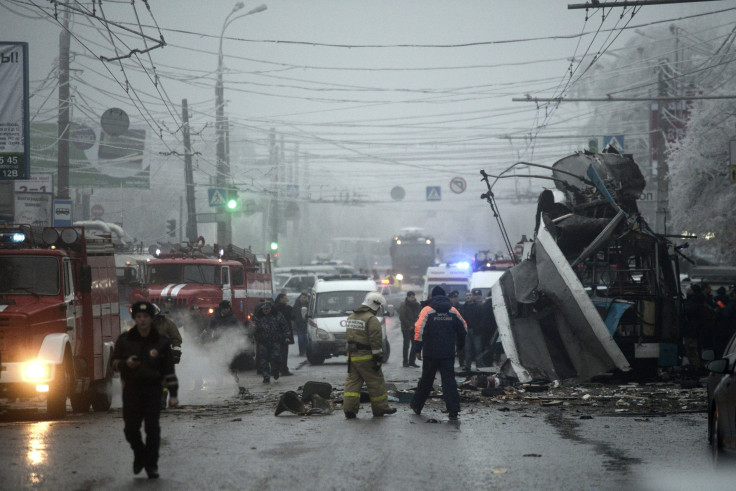UPDATE: Trolley Blast Toll Rises To 14, A Day After ‘Black Widow’ Suicide Bomber Struck Russian Train Station Killing 17

Update as of 3:52 a.m. EST: The bomb blast in a bus in Volgograd on Monday morning was carried out by a suicide bomber, Associated Press reported, citing Russia's main investigative agency, adding that the death toll, in the city's second suicide bombing in as many days, has risen to 14.
On Sunday, 17 people died in a railway station bombing, which was also blamed on a suicide bomber. Vladimir Markin, a spokesman for the Investigative Committee, said in a statement that the explosion, which occured on an electric bus involved a similar bomb, proving a link between the two attacks, AP reported.
Update as of 12:17 a.m. EST: A blast in a trolley bus in the city of Volgograd has killed at least 10 people, RT News reported Monday. And, at least 10 others have been injured in the blast on Monday morning, the report said, adding that police are investigating the cause. The explosion is believed to be from a fresh terrorist attack, RT News reported citing Russia’s Investigative Committee.
A female suicide bomber detonated a large explosive at the entrance hall of a train station in the southern Russian city of Volgograd on Sunday, killing at least 16 people and wounding dozens more, CNN confirms. The station was packed with people at the time of the attack, which occurred around noon, in part because several trains were delayed. It was the second deadly attack by a female suicide bomber in Volgograd in just over two months.
According to the Associated Press, the bomb detonated at the train station in Volgograd contained about 22 pounds of TNT and was loaded with shrapnel. According to Vladimir Markin, a spokesperson for Russia’s Investigative Committee, the female suicide bomber detonated her explosives in front of a metal detector just behind the station's main entrance. Investigators believe she was carrying the device in a backpack or bag. "When the suicide bomber saw a policeman near a metal detector, she became nervous and set off her explosive device," Markin said.
"Pieces of flesh mixed with shards of glass and smoke billowed from inside, I didn't even understand at first what was going on," Svetlana Zabotko, a local resident who witnessed the blast, told the Associated Press.
Dozens of people were injured during the blast, including a 9-year-old girl whose mother shielded her body at the time the explosion occurred. The mother was killed in the attack and the girl was taken to a hospital in critical condition, RT reports.
An attack by another female suicide bomber, who are often referred to as “black widows” because they are thought to be the widows or sisters of radical Islamic rebels, in October in Volgograd killed seven people. With the 2014 Winter Olympics in Sochi just around the corner, many are raising concerns over the country’s efficacy in preventing such attacks during the games in February.
"There can be no justification for such barbarous attacks,” North Atlantic Treaty Organization Secretary General Anders Fogh Rasmussen said in a statement. "NATO and Russia stand together in the fight against terrorism, including by working together on technology to prevent attacks on public transport systems."
Volgograd, located about 690 km northeast of the site of the Winter Olympics in Sochi, is a major transportation hub for trains traveling across western Russia. It lies close to Russia’s North Caucusus, a region of mostly Islamic provinces where militant groups associated with the insurgency that began in the region roughly 20 years ago carry out violent acts almost daily. The conflict’s roots go back to the early 1990s in Chechnya where a separatist struggle occurred and spread to neighboring provinces.
According to Ria Novosti, most of the militants responsible for the deadly attacks that have taken place in Russia over the past decade originated from this region.
Violent attacks have persisted in southern Russia since July after insurgent leader Doku Umarov, a Chechen warlord, issued a video in which he urged militants to use “maximum force” to prevent President Vladimir Putin from hosting the Winter Olympics in Sochi. According to CNN, Umarov described the Olympics in Sochi as being like “Satanic dancing on the tombs of our ancestors,” referring to the booting of Muslim inhabitants from the area by imperialist Russian soldiers in the 19th century.
The International Crisis Group, an international nonprofit whose goal is to shed light on conflicts around the world, recently issued a report detailing the severity of the violence in the North Caucusus region.
“Unresolved disputes over territory, administrative boundaries, land and resources are important root causes of the violence, along with ethnic and religious tensions, the state’s incapacity to ensure fair political representation, rule of law, governance and economic growth,” the organization’s report said. “The region’s internal fragmentation and insufficient integration with the rest of the Russian Federation contribute to the political and social alienation of its residents.”
It’s unclear exactly why the attackers target Volgograd, but its proximity to the Caucusus is believed to be a factor. Volgograd is the nearest major city to the Caucusus and is a major thoroughfare for travelers.
© Copyright IBTimes 2024. All rights reserved.












